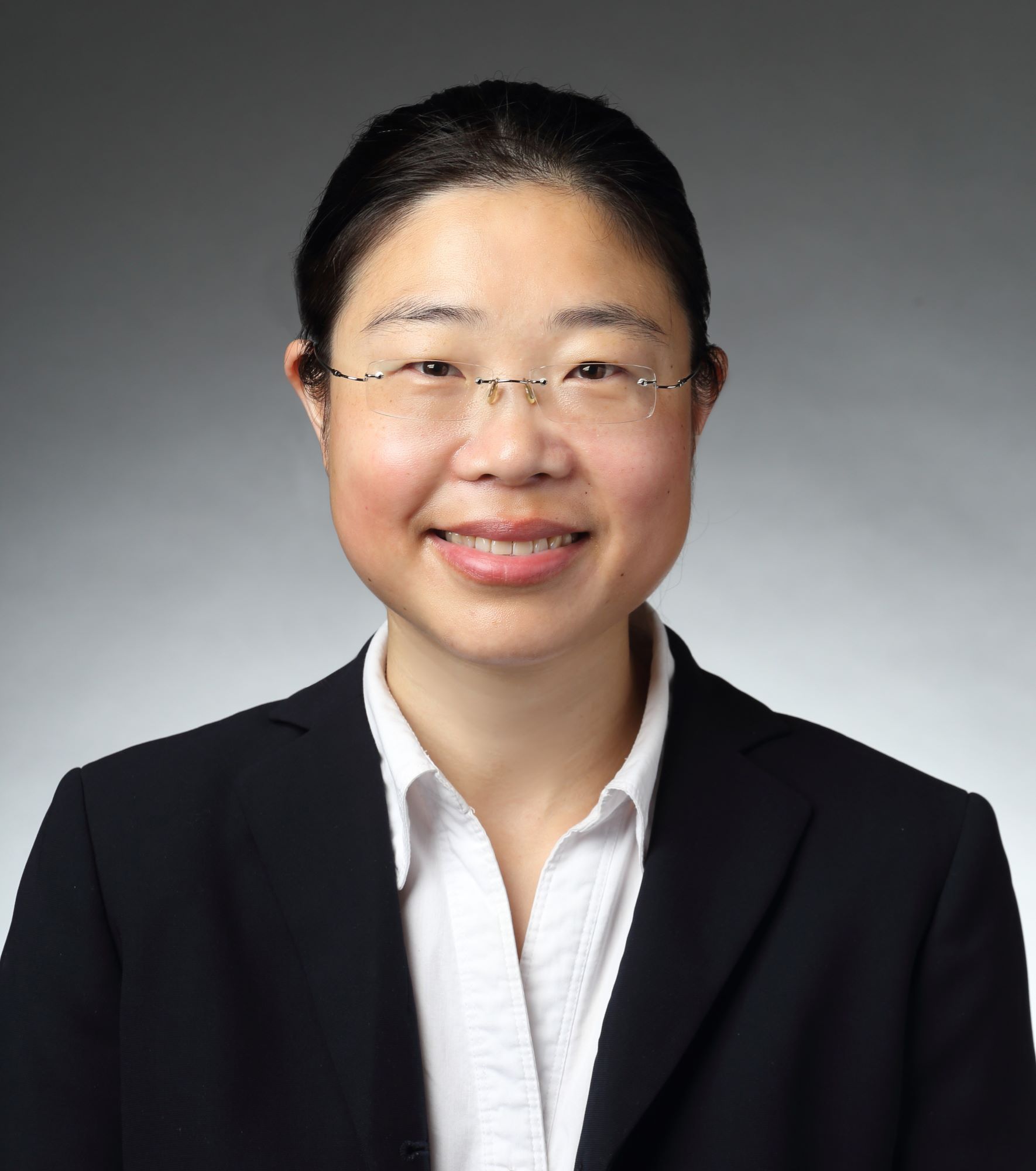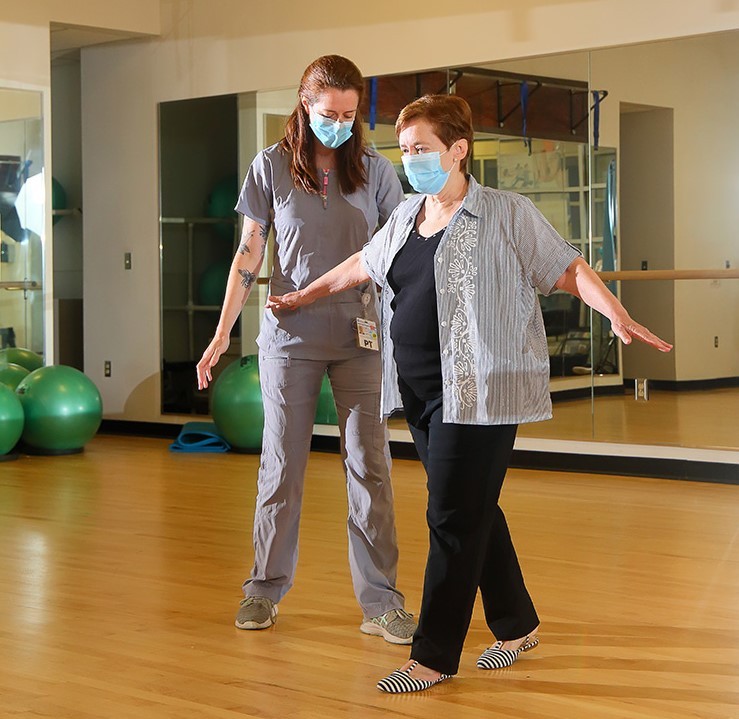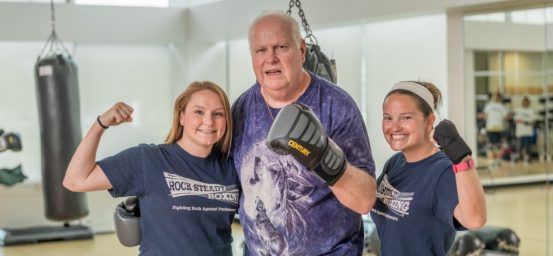Mobility and function are among the key indicators of good health across the lifespan. If you notice you’re having any issues with movement or functioning, you may benefit from an evaluation with CentraState’s Movement Disorder Program. This multidisciplinary program is designed to detect and manage any neurodegenerative issues early, when treatment is most effective.
 The Movement Disorder Program is led by Jia Zhen Cheng, MD, a board-certified neurologist who is fellowship-trained in movement disorders, in collaboration with skilled therapists at CentraState’s OceanFirst Rehabilitation Center and various other medical specialties. Together, they focus on optimal functioning and well-being for the body and mind.
The Movement Disorder Program is led by Jia Zhen Cheng, MD, a board-certified neurologist who is fellowship-trained in movement disorders, in collaboration with skilled therapists at CentraState’s OceanFirst Rehabilitation Center and various other medical specialties. Together, they focus on optimal functioning and well-being for the body and mind.
Trouble Moving Is Not a Normal Part of Aging

While difficulty with function and mobility can increase as people get older, movement issues are not always a normal part of aging. The Movement Disorder Program offers the focused expertise and experience to provide an in-depth evaluation that can identify a neurodegenerative condition if one is present.
Providing this level of insight often brings peace of mind for patients who have been experiencing undiagnosed symptoms. Whether symptoms are a part of aging or something more, our experts can refer you to the necessary resources and customize a treatment program to help you improve function and decrease symptoms.
Movement Disorder Diagnosis
You may benefit from an evaluation with the Movement Disorders Program if you’re experiencing:
- Stiffness
- Difficulty moving
- Balance issues
- Frequent falls
- Tremors or shakiness
- Involuntary movement or muscle spasms
In addition, some symptoms that may not seem related to a movement disorder are important to evaluate, because they can have a neurodegenerative link. These include:
- Cognitive issues, like trouble remembering or thinking clearly
- A new onset of small handwriting or low voice
- Depression or anxiety
- Impulsive behaviors
- Fatigue
- Trouble sleeping
- Loss of smell
- Difficulty swallowing
- Urinary incontinence (issues with bladder control)
- Constipation
- Dizziness when you stand up
Specialized Treatments for a Variety of Movement Disorders
 The Movement Disorder Program diagnoses and treats patients with conditions such as:
The Movement Disorder Program diagnoses and treats patients with conditions such as:
- Parkinsonism (a group of neurological disorders that have symptoms similar to Parkinson’s disease)
- Parkinson’s disease
- Huntington’s disease
- Functional movement disorders (difficulties in functioning without a specific biological cause that may relate to an underlying mood disorder)
- Restless legs syndrome
- Gait disturbances
- Tremors
- Dystonia (persistent muscle contractions)
- Ataxia (unsteadiness that may cause difficulty walking)
Deep Brain Stimulation
Deep brain stimulation (DBS) is a treatment that can help patients with essential tremor or Parkinson’s disease experience tremors less frequently and often decrease tremor medications. DBS helps “reprogram” the portion of the brain that controls movement so that the brain’s electric signals fire in a more regulated pattern. The procedure involves carefully placing electrodes within the brain through a pre-designated route, and implanting a pulse generator – a device similar to a pacemaker – under the skin of the chest to control and adjust the electrical current.
“After DBS, 80 to 90 percent of patients see improved clinical symptoms, reduce their use of related medications, and enjoy a better quality of life,” says Jia Zhen Cheng, MD.
What To Expect at Your Appointment
At your first appointment at CentraState’s Movement Disorder Program, you’ll meet with a physical therapist at the OceanFirst Rehabilitation Center to review your medical history and undergo a screening that checks your balance, strength, and cognitive function. Next, you’ll meet with Jia Zhen Cheng, MD, who will conduct a thorough medical history and physical examination. She also may order diagnostic tests, which can include:
- Blood tests, which may include genetic testing
- MRIs or CT scans
- A DaTscan™, an innovative imaging technique available at CentraState that can help distinguish Parkinson’s disease from conditions like essential tremors and drug-induced Parkinsonism
Once testing is complete, Dr. Cheng will review the results with you, provide insight on next steps, and work with the OceanFirst Rehabilitation Center team and other medical specialties as needed to develop a customized treatment plan.
Custom Treatment Plans
The Movement Disorder Program’s treatment approach is a comprehensive strategy that is tailored to meet your unique needs. In addition to Dr. Cheng’s focused expertise in neurodegenerative conditions and movement disorders, our OceanFirst Rehabilitation Center team has extensive training and experience in treating those with neurologic conditions. Staff members incorporate the latest evidence-based practices into treatment protocols.
In addition to physician management of your condition, treatment may include:
- Medication management
- Physical therapy to improve strength, balance, endurance, and mobility
- Occupational therapy to assist with activities of daily living and maximize independence
- Speech, language, and voice therapy
- Cognitive therapy, which focuses on skills like attention, memory, and visual-spatial abilities
- Participation in CentaState’s Balance and Dizziness Program
- One-on-one consultations with a dietitian
- Referrals to other specialties as needed, including neuromuscular specialists, neurosurgeons, neuropsychologists, or psychiatrists, as psychiatric disorders are common in those with movement disorders
- Unique rehabilitation and wellness programs specific to those with Parkinson’s disease, including:
- Rock Steady Boxing, a specialized boxing fitness/physical therapy program
- The Lee Silverman Voice Treatment LSVT BIG® program, a four-week protocol that helps improve mobility and expand range of motion
- The LSVT LOUD® program, which focuses on voice projection, improved vocal quality, and speaking confidence
- A Parkinson’s Exercise Program, featuring supervised exercise and group support
- A specialized tai chi class
In addition, to complement your treatment, our team can recommend a variety of LIVE LIFE WELLSM fitness and wellness options available through the Star and Barry Tobias Health Awareness Center. These offerings range from weight management and healthy cooking classes to yoga and meditation.



